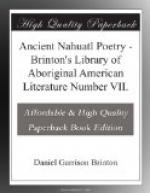HUITZNAHUACATL, 91. A ruler of Huexotlan (Clavigero); a member of the Huitznahua, residents of the quarters so called in Tezcuco and Tenochtitlan (Ixtlilxochitl, Hist. Chichimeca, cap. 38).
IXTLILXOCHITL, 35, 46, 89. A ruler of Acolhuacan, father of Nezahualcoyotl. Comp. ixtli, face, tlilxochitl, the vanilla (literally, the black flower).
IZTACCOYOTL, 89, 93. “The white wolf.” Name of a warrior otherwise unknown.
MEXICANS, 67, 83, 85, 87, 123, 125. See
MEXICO, 83, 123. Name of the town and state otherwise called Tenochtitlan. Mexitl was one of the names of the national god Huitzilopochtli, and Mexico means “the place of Mexitl,” indicating that the city was originally called from a fane of the god.
MICTLAN, 95, 117, 119. The Mexican Hades, literally, “the place of the dead.”
MONTEZUMA, 14, 41, 113. The name of the ruler of Mexico on the arrival of Cortes. The proper form is Moteuhzomatzin or Motecuhzomatzin, and the meaning, “he who is angry in a noble manner.” ("senor sanudo,” Cod. Ramirez, p. 72; “qui se fache en seigneur,” Simeon, Dict. de la Langue Nahuatl, s. v.).
MOQUIHUIX, 33. The fourth ruler of Tlatilolco. He assumed the power in 1441, according to some writers (Bustamente, Tezcoco, en los Ultimas Tiempos de sus Antiguos Reyes, p. 269). The name probably means “He who comes forth a freeman.” See Ixtlilxochitl, Historia Chichimeca, caps. 36, 51.
NACXITL TOPILTZIN, 105, 107. Nacxitl, “the four footed” (nahui, ixitl), was the name of one of the gods of the merchants (Sahagun, Hist, de Nueva Espana, Lib. I, c. 19). In the song it is applied to Quetzalcoatl, who was also regarded as a guardian of merchants.
NAHUATL, (9, etc.). A term applied to the language otherwise known as Aztec or Mexican. As an adjective it means “well-sounding,” or, pleasant to the ear. From this, the term Nahua is used collectively for all tribes who spoke the Nahuatl tongue. Nahuatl also means clever, skillful, and the derivation is probably from the root na, to know.
NECAXECMITL, 46. Name of uncertain meaning of a person otherwise unknown.
NEZAHUALCOYOTL, 35, 67, 119. Chief of the Acolhuas, and ruler in Tezcuco from 1427 to 1472, or thereabouts. He was a distinguished patron of the arts and a celebrated poet. See p. 35, et seq.
NEZAHUALPILLI, or NEZAHUALPIZINTLI, 14, 125. Ruler of Acolhuacan, son of Nezahualcoyotl. His accession is dated in 1470 or 1472.
NONOHUALCO, 105, 125. Name of one of the quarters of the ancient city of Mexico; also of a mountain west of the valley of Mexico. The derivation is probably from onoc, to lie down; onohua, to sleep; onohuayan, a settled spot, an inhabited place. The co is a postposition.




